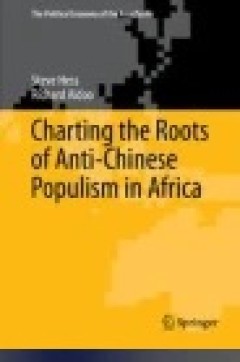Filter by

Conservation for cities : how to plan & build natural infrastructure
It's time to think differently about cities and nature. Understanding how to better connect our cities with the benefits nature provides will be increasingly important as people migrate to cities and flourish in them. All this urban growth, along with challenges of adapting to climate change, will require a new approach to infrastructure if we're going to be successful. Yet guidance on how to p…
- Edition
- -
- ISBN/ISSN
- 9781610915236
- Collation
- 268 pages
- Series Title
- -
- Call Number
- 370

Green Development in China Models and Discussions
This book focuses on the key determinants of China’s sustainable development in the general context of globalization from an environmental perspective. The author presents expert analysis on China’s role in the world economy, trade openness, cross-border investments and sustainable development in China. Readers will gain an in-depth understanding of various important issues concerning China…
- Edition
- -
- ISBN/ISSN
- 978-981-10-0692-0
- Collation
- VIII, 68
- Series Title
- -
- Call Number
- 330 JIA g

Great Divergence and Great Convergence A Global Perspective
This new monograph provides a stimulating new take on hotly contested topics in world modernization and the globalizing economy. It begins by situating what is called the Great Divergence--the social/technological revolution that led European nations to outpace the early dominance of Asia--in historical context over centuries. This is contrasted with an equally powerful Great Convergence, the r…
- Edition
- -
- ISBN/ISSN
- 978-3-319-17779-3
- Collation
- XII, 251
- Series Title
- -
- Call Number
- 330 GRI g

Government Austerity and Socioeconomic Sustainability
This short book integrates the imperatives of public debt sustainability with those of socioeconomic sustainability in the context of budget austerity measures. It is argued that poverty, inequality and unemployment problems should be integral aspects of policy frameworks for austerity and fiscal stability. The economics of austerity in much of economic analysis remains narrowly focused and lop…
- Edition
- -
- ISBN/ISSN
- 978-3-319-04234-3
- Collation
- VII, 44
- Series Title
- -
- Call Number
- -

Governance of Hospitals in Central and Eastern Europe
This book presents a novel view of healthcare system transition in post-communist countries. It is the first region-wide comparative study of hospital governance in Eastern Europe. Comprehensive new material shows the evolution and significance of governance, complementing recent publications on the topic from industrialised countries. Throughout the book, governance is described and substantia…
- Edition
- -
- ISBN/ISSN
- 978-981-287-765-9
- Collation
- Health Economics
- Series Title
- -
- Call Number
- 330 SOW g

Charting the Roots of Anti-Chinese Populism in Africa
This book investigates China’s emergence as an outside player in SSA over the last several decades and the current understanding of the impact of Beijing’s growing presence on the continent, including several case studies focused on specific SSA countries. China’s accelerating economic and political engagement with sub-Saharan Africa (SSA) has gained growing attention in political and aca…
- Edition
- -
- ISBN/ISSN
- 978-3-319-17629-1
- Collation
- -
- Series Title
- -
- Call Number
- 337

Regularity Theory for Mean-Field Game Systems
Beginning with a concise introduction to the theory of mean-field games (MFGs), this book presents the key elements of the regularity theory for MFGs. It then introduces a series of techniques for well-posedness in the context of mean-field problems, including stationary and time-dependent MFGs, subquadratic and superquadratic MFG formulations, and distinct classes of mean-field couplings. It a…
- Edition
- -
- ISBN/ISSN
- -
- Collation
- -
- Series Title
- -
- Call Number
- -

Regional Science Matters: Studies Dedicated to Walter Isard
This volume is a collection of fresh and novel contributions to regional science. They commemorate the scientific inheritance of the founding father of regional science, the late Walter Isard. All papers are written by well-known scholars in the field and serve to highlight the great importance of regional science theory and methodology for a better understanding of current spatial and environm…
- Edition
- -
- ISBN/ISSN
- -
- Collation
- -
- Series Title
- -
- Call Number
- -

Consumer Economic Wellbeing
This timely text overviews theories, concepts, and contexts relating to the emerging field of behavioral economics. Research theories and data gathered across psychology, sociology, marketing, finance, and other relevant disciplines are synthesized to identify and elaborate on the defining aspects of consumer economic wellbeing. Against a background of consumer rights and responsibilities, the …
- Edition
- -
- ISBN/ISSN
- 9781493928217
- Collation
- -
- Series Title
- -
- Call Number
- 370

Regional Development and Public Policy Challenges in India
This book emphasizes the need for experimenting with more deliberate and rigorous policy processes to attain balanced regional development, which can promote both equity and efficiency in India’s development discourse. The institutional mechanisms for dealing with regional imbalance in India have not been very successful so far. With rising discrepancies in development, demand for autonomy co…
- Edition
- -
- ISBN/ISSN
- -
- Collation
- -
- Series Title
- -
- Call Number
- -
 Computer Science, Information & General Works
Computer Science, Information & General Works  Philosophy & Psychology
Philosophy & Psychology  Religion
Religion  Social Sciences
Social Sciences  Language
Language  Pure Science
Pure Science  Applied Sciences
Applied Sciences  Art & Recreation
Art & Recreation  Literature
Literature  History & Geography
History & Geography